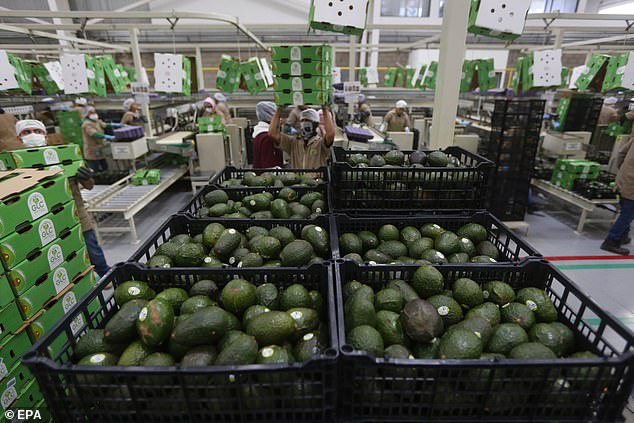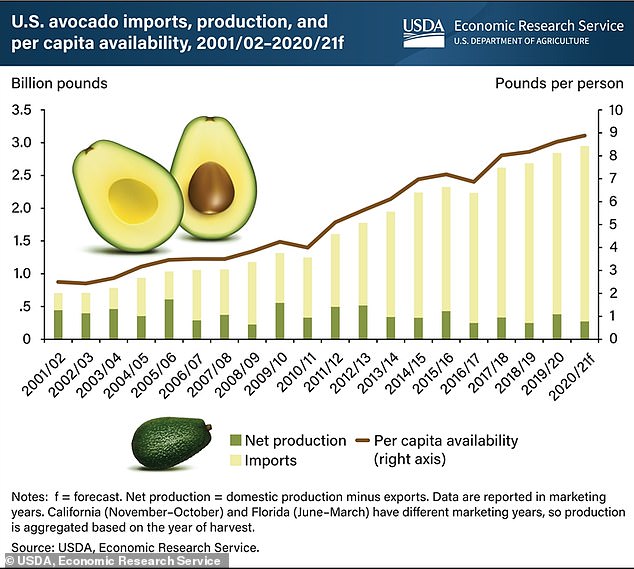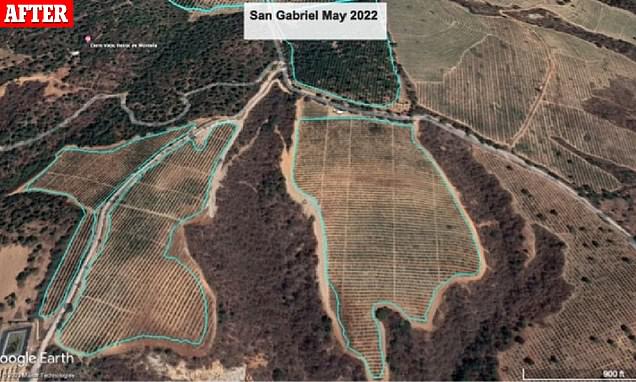How America’s love of avocados is destroying the planet: Shocking before and after images shows forests in Mexico wiped out by over-farming
>
The U.S. thirst for avocados has destroyed forests in Mexico as farmers try to keep up with demand.
Up to 70,000 acres of Mexican forest have been cleared to grow Gen Z’s favorite fruit over the past 10 years, according to a shocking new report.
This is the equivalent of two to five Manhattans, and the avocados exported to the United States in 2022 alone consumed the equivalent of 290,000 Olympic swimming pools of water.
The avocado industry in Mexico also depends on blood. Cartels have entered the fray in the past 20 years, intimidating, kidnapping and even killing activists and local leaders who dare to challenge unchecked deforestation.
The popularity of this fruit has skyrocketed in the United States since 2000, partly due to its reputation as a healthy source of heart-healthy unsaturated fats.
San Gabriel, a municipality in Jalisco, has lost thousands of acres of forest since 2014, mostly due to the illegal burning of avocado groves. Despite this, avocados grown in the areas shaded in blue have been approved for export to the United States
Meanwhile, domestic production has remained stagnant and even declined in recent years.
Mexican imports make the difference, but its forests and people pay the price for Americans’ insatiable appetite, according to a report by Climate Rights International (CRI), titled “Guacamole is unholy.’

Workers pack avocados in Jalisco, one of two Mexican states whose forests have been destroyed by the avocado growing industry.
Americans consume nearly 3 billion pounds of avocados annually, a number that has more than tripled since 2000.
About 90 percent of this total comes from Mexico.
The environmental price of this insatiable appetite includes illegal deforestation for avocado orchards, the theft of water to feed them, and violence against indigenous people as cartels get into the booming business.
“Mexico is the leading global producer of avocados, and the United States is the primary destination for Mexican avocado exports,” according to the U.S. Department of Agriculture (USDA).
Historically, American farmers produced hundreds of millions of pounds of avocados each year, but those numbers have declined recently.
“Imported avocados now account for 90 percent of the domestic supply compared to 40 percent in the early 2000s,” the USDA reported.
The United States imported an average of 55 million pounds annually from 2001 to 2003, according to the USDA. mentioned last year. But from 2019 to 2021, this figure rose to £2.25 billion each year on average.
A new CRI report reveals the environmental and human costs of this growth, focusing on the states of Michoacán and Jalisco, where all Mexican avocados exported to the United States are grown.
In addition to the vast tracts of forest lost to avocado farming, avocado producers use vast amounts of water, many illegally extracting it from streams, rivers, springs and aquifers to irrigate their orchards, according to CRI.

US consumer demand for avocados has risen steadily, but domestic production has declined. Mexico makes up the bulk of the difference. From 2001 to 2003, the United States imported an average of 55 million pounds of avocados each year. From 2019 to 2021, this annual average reached 2.25 billion pounds. In that time period, 88% of imports came from Mexico
This extraction has led to water shortages for people living in these areas.
Since forests help hold soil in place during rainstorms, the loss of native pines and oaks increases the risk of deadly floods and landslides.
In Michoacan and Jalisco alone, there are more than 50,000 avocado orchards certified to export avocados to the United States, according to CRI.
“Almost all deforestation for avocado cultivation in Michoacán and Jalisco over the past two decades has violated Mexico’s federal criminal code, which prohibits ‘land use change’ of forest areas to agricultural production without government authorization,” the group stated.
Not only is it illegal to change land use without federal permission, but the specific way farmers do it is illegal: by starting wildfires.
Although farmers are replacing forests with avocado trees, orchards are not environmentally like forests.
The habitat loss for native species that comes from destroying natural forests is incalculable, and burning all those trees releases tons of greenhouse gases and removes carbon-storing trees from the ecosystem.
All of this deforestation has been driven by US demand for avocados, but the IRI places the real blame on the US and Mexican federal governments, as well as local authorities in Michoacan and Jalisco, all of which have the power to do something about it but have failed to solve the problem. Represent.
CRI said the failure of local environmental authorities comes from two sides of the same coin: corruption and violence.
In the first case, the unit of the Michoacan state prosecutor’s office, which is supposed to investigate avocado-related deforestation, is riddled with corruption, CRI alleged. This allows bad actors to act with impunity, as they laugh at the impotence of the Forestry Commission, according to one forest official.
When farmers face rejection, violence or the threat of violence has silenced opposition to government authorities and communities who have tried to hold them accountable.
In an industry worth billions of dollars annually, this problem is getting worse as criminal gangs try to get a piece of the action.
When local community groups tried to confront the farmers, some of their members were kidnapped or even killed.
It was not only the Mexican government that failed to stop the wave of illegal deforestation, but also the United States.
According to CRI, the US government “routinely certifies illegally deforested orchards for export to American consumers.”
In the absence of substantive action by the authorities who are supposed to protect the land and communities, some locals have taken matters into their own hands.
For example, in Chiran, a municipality in Michoacan, locals are fed up with illegal logging and unchecked violence. In 2011, they expelled the local government and created their own.
This included a police force to enforce the government’s new anti-deforestation laws, and Michoacan eventually recognized this group’s authority.
But local solutions cannot be the only force against such widespread issues, the CRI report said.
Therefore, the group published a list of recommendations in its report, including calling on the Mexican and US governments to properly enforce laws related to deforestation and avocado cultivation. This includes a US commitment to ban the import of avocados grown on illegally deforested lands.
But last year, the United States approved avocado imports from Jalisco without putting in place any safeguards to prevent deforestation.
As Americans grow hungrier for avocados each year, these problems will continue to worsen if authorities don’t act soon, CRI said.
“Urgently enacting and implementing such regulations and policies is essential to avoid climate catastrophe, and to protect the rights of residents where goods are produced,” they wrote.
(Tags for translation)dailymail

